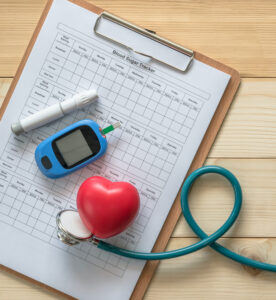Manage Type 2 Diabetes and Heart Disease in 3 Ways

Manage Type 2 Diabetes and Heart Disease in 3 Ways
Two of the most common chronic illnesses in the United States are type 2 diabetes and heart disease. Its commonness may be attributed to findings dictating a close link between the two, as shown in the facts below:
- Having diabetes makes you twice as likely to develop heart disease or stroke as someone who doesn’t have diabetes. You’re also expected to experience both at a younger age.
- Adults with diabetes are more likely to die from heart disease than adults that don’t have the condition.
- Sixty-eight percent of people with diabetes aged 65 and older are expected to die from a form of heart disease, while 16 percent are expected to die of stroke.
- The two most common causes of death in adults with diabetes are heart disease and stroke.
If you have been diagnosed with type 2 diabetes, you know how important it is to take care of your body and health properly. To do that, here are three of the best ways to take care of yourself:
- Have a Heart-Healthy Diet
Your fat and carbohydrate intake are vital in managing your diabetes and heart disease. However, you should be paying attention to the overall amount you eat and the nutrient types you consume. You should be limiting your intake of saturated fat, found in meat, dairy, and some tropical oils. Saturated fat can raise levels of unhealthy LDL cholesterol in your body, which can lead to a buildup of fatty deposits in your arteries.
Another thing you need to avoid is refined carbohydrates, which are refined sugars and processed grains that can be found in desserts and snacks. These types of food can increase your blood sugar levels fast, and they’re also associated with higher rates of heart disease. - Get Lots of Physical Activity
Exercising has been proven to lower the risks of cardiovascular disease in people with diabetes. That’s why the primary focus of people with this condition should be aerobic exercises, such as walking, biking, jogging, and swimming. Aerobic exercises strengthen your heart, helping it pump more efficiently and improving your blood flow. But before you get on to exercising, it’s best to consult with your diabetes healthcare team for the best exercise plan for you. If you’re a beginner, you should begin slow and talk to your physician before doing any physical activity. Moreover, resistance exercises also help since muscles are a primary consumer of glucose in the body. Research shows that combining aerobic and resistance exercise may be more beneficial for people with type 2 diabetes. - Maintain a Healthy Weight
Being overweight or obese may mean that you have metabolic factors that increase your blood sugar and risk of developing heart disease. That is especially true if you carry excess fat in particular areas of your body.
Abdominal body fat or visceral body fat concentrated around the organs means that you have insulin resistance. But losing weight can help decrease your blood glucose levels, and you may see a drop in your cholesterol and triglycerides. Losing weight can also help lower your blood pressure.
Conclusion
Having heart disease and diabetes means that there should be certain restrictions around your diet and a close health plan to follow. Maintaining your health while dealing with these two conditions can be challenging, but you can keep yourself healthy through a good diet and exercise.
Morristown Post Acute Rehabilitation and Nursing Center is a premier nursing home located in front of the Morristown Medical Center. Our center serves as a bridge between the hospital and your home. With our patient-centered care, you’ll feel hospital-grade services and your home’s comfort.
As a 24-hour nursing care in Morristown, we deliver revolutionizing care and a comprehensive clinical experience imbued with warmth and compassion. Call us at 973-946-8685 and let us know how we can help!